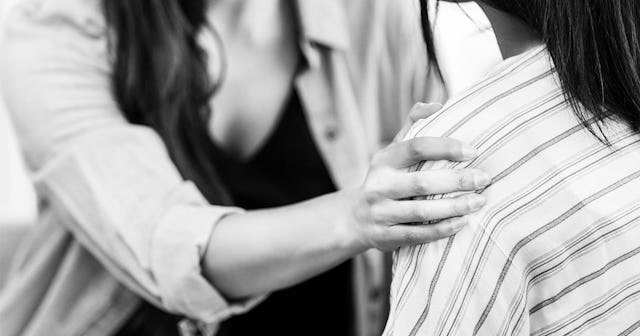My Child Told A Racist Coronavirus Joke, And I'm Pissed At The Adults Who Promote These Behaviors

We were gathered around the dining table, enjoying an extended family meal this past weekend. As we devoured tacos, my kids started entertaining the adults by telling various jokes. My son, a first grader, told some classics, basking in the attention. Then one of my tweens piped up that she also had a joke to share. What she said next horrified me.
She proceeded to tell a joke about Asian people—along the lines of, don’t order Chinese food–and the coronavirus. I’ll spare you the exact details. My eyes grew wide, and I blurted out, “That’s racist.” My daughter immediately appeared shocked, then embarrassed. I wasn’t pissed at my child, or even the peer who told the joke. Rather, I was seriously ticked at the adult, whomever invented this joke and whomever decided it was OK to start disseminating it like candy at Halloween.
I realize my initial reaction wasn’t my best parenting work. I proceeded to ask my child for the details. Who told her the joke? When? What happened when others heard it? I learned a peer had shared the joke in a group of kids, and the response was laughter. I highly doubt any of them understood what was being shared, just like my own daughter didn’t get the punchline. All I know is that laughter can be contagious and feed a person’s ego, so sometimes jokes are shared simply to gain personal popularity. Obviously, the coronavirus is a hot topic right now, making the joke even more contagious—pun intended.
Everyone is talking about the coronavirus, just as much, if not more, than the Democratic nominee, influenza, and the latest celebrity scandal. Even if children don’t overhear adults discussing it, the coronavirus outbreak is all over social media and the news. There’s really no escaping it. My kids come home from school daily and tell me something—mostly inaccurate—about the coronavirus.
We haven’t focused much on it at all in our home. It’s not that we don’t care or aren’t concerned, and I certainly don’t condone #45’s ignorant responses. However, our lives are just busy with six of us going to work, school, appointments, and other activities. Our day-to-day existence doesn’t yield a lot of spare time for trending topics and scientific discussions.
Frankly, I’m also not going to instill fear in my kids over something we cannot control. Though I know some people are rushing out to stockpile hand sanitizer and canned goods, depleting store shelves, we’re not. I’m not here for the Doomsday prepping. I have enough anxiety as it is. I really don’t need more.
However, when my daughter told the coronavirus joke, I decided it was time to have a serious conversation with my older kids about what was going on. I offered them some facts, including information that my brother-in-law, who is a family physician, relayed to me. I was matter-of-fact, not exaggerating nor underestimating the impact of a legitimate public health scare.
Then I moved on to talk about the racism that’s embedded in so many coronavirus conversations. My children listened attentively, asked questions, and seemingly understood what I was sharing with them. I reiterated that we never, ever make fun of someone because of their race, gender, ability, religion, appearance, or anything else. I also shared that some of our friends who are Korean and Chinese have been bearing the brunt of racism right now—and it’s most definitely not OK.
gradyreese/Getty
This also led to a conversation about stereotypes of black people. My children are all black, and we’ve discussed before—and now again—the damage that stereotypes and “jokes” can cause. Black girls like my three daughters are stereotyped as being sassy, street-smart, loud, and strong (stronger than a person who isn’t black). Black boys, like their younger brother, are believed to be untrustworthy, scary, and tough. These stereotypes are hurtful and ignorant. We have to reject racism in every form, every time.
We also discussed some of the other stereotypes our Asian friends must deal with. Asians are presumed to be good at math and excellent musicians. One of our friends was the subject of peers telling her that she probably has the coronavirus and her family must eat dogs and cats for dinner. Yes, people are that ignorant.
I am thankful I had the opportunity to talk to my children about the joke and why the coronavirus isn’t funny—not one bit. However, I’m still reeling over the ignorance of whomever created the joke in the first place and then started spreading it, person to person. Ironic, isn’t it? The virus itself spread, and this racist joke is spreading, too.
Racism is never OK. A public health crisis isn’t something to crack up about, either. Putting the two of them together is even more inappropriate. As I shared with my tweens, it’s important to get your facts straight, garnering information from legitimate sources. It’s also important that we don’t try to be funny at the expense of another person.
No thanks to the ignorant jack-hole who decided to tell a racist coronavirus joke that eventually would be picked up by tweenagers, including mine. If any good has come out of this situation, it’s that my kids now know to think twice about spewing a joke about something they know nothing about. Because if they choose to repeat the joke, they may be subjecting others to the very thing our family is so adamantly against.
This article was originally published on